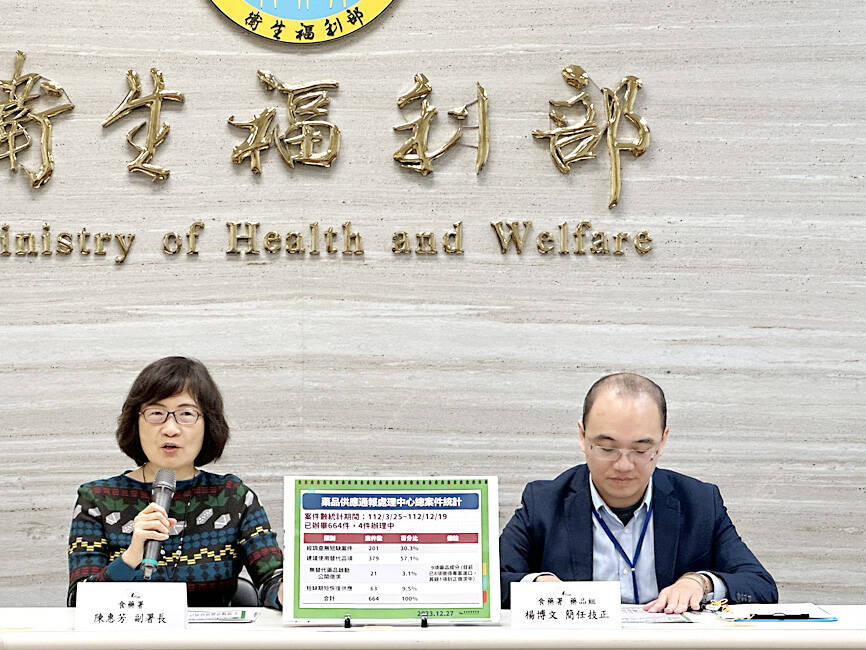The Food and Drug Administration (FDA) yesterday said that a Gallium citrate GA 67 injection used to diagnose Hodgkin’s disease, lymphoma and bronchogenic carcinoma would soon face a supply shortage, so it is initiating a special import program for the radiopharmaceutical agent.
The FDA in April launched a drug supply report platform to ensure steady supply of essential drugs in response to possible shortages after the COVID-19 pandemic.
FDA Deputy Director Cheng Hwei-fang (陳惠芳) yesterday said that as of Tuesday last week it had handled 664 reports and is still dealing with four others.

Photo: CNA
Among them, 201 reports, or 30.3 percent, were found to have no shortage problem, 379 (57.1 percent) reports resulted in recommendations to use alternative drugs as a temporary substitute, 63 cases (9.5 percent) had a short period of shortage, but quickly resumed normal supply and 21 cases (3.1 percent) did not have alternatives and were subject to open solicitation, Cheng said.
The 21 investigations that showed there was no alternative drugs available included nine with active ingredients, she said.
Eight of the nine have been approved for special import programs and the other, the Gallium citrate injection, is also under an open solicitation process, she added.
There is only one company in Taiwan with a permit to manufacture Gallium citrate, but due to routine maintenance of its equipment, it would temporarily stop producing the drug from Feb. 7 to March 18, Cheng said, adding that as there are no alternative drugs, open solicitation was initiated last month.
FDA Medicinal Products Division senior specialist Yang Bo-wen (楊博文) said the half-life of gallium 67 is about 70 hours, so the drug cannot be mass produced and stored.
It is usually ordered by hospitals when there is clinical demand, Yang said, adding that about 40 vials are used per week.
A vial provides enough of the drug for multiple injections, and the dosage differs according to the patient and the test being done, so it is difficult to estimate how many people might be affected by the shortage, he said.
There is a company that has applied to import the drug and is in the contract signing process, which is expected to help ease the shortage by February, Cheng said.
Additional reporting by CNA

Taiwan is to commence mass production of the Tien Kung (天弓, “Sky Bow”) III, IV and V missiles by the second quarter of this year if the legislature approves the government’s NT$1.25 trillion (US$39.78 billion) special defense budget, an official said yesterday. Commenting on condition of anonymity, a defense official with knowledge of the matter said that the advanced systems are expected to provide crucial capabilities against ballistic and cruise missiles for the proposed “T-Dome,” an advanced, multi-layered air defense network. The Tien Kung III is an air defense missile with a maximum interception altitude of 35km. The Tien Kung IV and V

The disruption of 941 flights in and out of Taiwan due to China’s large-scale military exercises was no accident, but rather the result of a “quasi-blockade” used to simulate creating the air and sea routes needed for an amphibious landing, a military expert said. The disruptions occurred on Tuesday and lasted about 10 hours as China conducted live-fire drills in the Taiwan Strait. The Civil Aviation Administration (CAA) said the exercises affected 857 international flights and 84 domestic flights, affecting more than 100,000 travelers. Su Tzu-yun (蘇紫雲), a research fellow at the government-sponsored Institute for National Defense and Security Research, said the air

Taiwan lacks effective and cost-efficient armaments to intercept rockets, making the planned “T-Dome” interception system necessary, two experts said on Tuesday. The concerns were raised after China’s military fired two waves of rockets during live-fire drills around Taiwan on Tuesday, part of two-day exercises code-named “Justice Mission 2025.” The first wave involved 17 rockets launched at 9am from Pingtan in China’s Fujian Province, according to Lieutenant General Hsieh Jih-sheng (謝日升) of the Office of the Deputy Chief of the General Staff for Intelligence at the Ministry of National Defense. Those rockets landed 70 nautical miles (129.6km) northeast of Keelung without flying over Taiwan,

City buses in Taipei and New Taipei City, as well as the Taipei MRT, would on Saturday begin accepting QR code payments from five electronic payment providers, the Taipei Department of Transportation said yesterday. The new option would allow passengers to use the “transportation QR code” feature from EasyWallet, iPass Money, iCash Pay, Jkopay or PXPay Plus. Passengers should open their preferred electronic payment app, select the “transportation code” — not the regular payment code — unlock it, and scan the code at ticket readers or gates, General Planning Division Director-General Liu Kuo-chu (劉國著) said. People should move through the